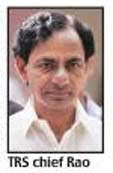 IT HAS been an extraordinary fortnight in politics. A fortnight of extraordinary U- turns and flip- flops that has brought the once comfortably placed Congress government in Andhra Pradesh to the brink. With 13 pro- ministers resigning, the future of the K. Rosaiah- led government appears bleak. Worse, 11 of the 31 Congress Lok Sabha MPs have also threatened to resign. Should they get serious, the fallout would shake the Centre. Rebellious regional leaders are holding the Centre to ransom and the heavy hand of the Congress high command doesn’t seem to carry much weight anymore.
IT HAS been an extraordinary fortnight in politics. A fortnight of extraordinary U- turns and flip- flops that has brought the once comfortably placed Congress government in Andhra Pradesh to the brink. With 13 pro- ministers resigning, the future of the K. Rosaiah- led government appears bleak. Worse, 11 of the 31 Congress Lok Sabha MPs have also threatened to resign. Should they get serious, the fallout would shake the Centre. Rebellious regional leaders are holding the Centre to ransom and the heavy hand of the Congress high command doesn’t seem to carry much weight anymore. The crisis was triggered by two contradictory statements that P. Chidambaram made within a fortnight. The first, on December 9, announced that a new state of Telangana will be carved out of Andhra Pradesh. Exactly two weeks later, the Centre flip- flopped. Surprised? No. Because the Congress knew, the opposition knew, you, me and everyone else knew that the first statement had nothing to do with any moral, administrative or political choice that the government had made about the new state. It was dragged out of the Centre by the campaign led by K. Chandrashekhara Rao of the Telangana
Rashtriya Samithi with the overwhelming support of the people of the Telangana region. The first statement was aimed just at getting Rao, who was on the 11th day of his fast- unto- death and dangerously slipping, to give up his protest and help douse the fire that had been raging throughout Telangana.
The Centre was never serious about Telangana, just as it has never been in favour of smaller states.
The Centre was never serious about Telangana, just as it has never been in favour of smaller states.
The rapid growth of Uttarakhand, Jharkhand and Chhattisgarh since their breakup from large unwieldy states nine years ago is proof that smaller is better. Proposals for the creation of these states lay pending with successive Congress governments for years but it was the BJP- led NDA government that brought them into existence. In the 62 years since Independence, the Congress may have changed its economic philosophy from socialist to mixed, and then to market driven, but when it comes to administration, the Grand Old Party has always been wary of carving up big states for fear of losing control over large and prosperous parts of the country.
Such fears, I think, are unfounded. Though out of power in both states now, the Congress has had long government tenures in Chhattisgarh and Uttarakhand, both states where along with the BJP, it remains a dominant player. Power has eluded the Congress in Jharkhand thus far but if last week’s assembly results are any indication, it may not remain so for- TRS chief Rao ever. Conceded, the small matter of Hyderabad is the biggest hurdle in the creation of Telangana but I believe that if the new state comes into being, the Congress has a better chance of coming to power than the TRS that has spearheaded the cause of the new state. Of the 294 members of the Andhra Pradesh assembly, 119 are from Telangana. Of them, the Congress contingent is the largest at 51, more than thrice as that of the TRS. If West Bengal were to be carved into smaller states, the loss would be that of the CPM and not the Congress. If a new Vidharba state were created out of Maharashtra, the Congress- NCP combine can be expected to steamroll the opposition.
Where it currently has one chief minister, the party will have two and I assume that in states where it has none, bifurcation will enable the Congress to grab at least one. Politically, it is desirable, administratively it is more viable, so why are they still hesitating? It has to do with Congress apprehensions of the longevity of the UPA government itself.
Though its ministers and party leaders strut around with the confidence of a regime that has a two- thirds majority, the UPA is still short of a simple majority and depends on support from outside, of parties like Mulayam Singh Yadav’s SP, which is opposed to breaking up large states into smaller ones. It’s a Catch- 22 situation for the UPA. There is no textbook formula that can please all the parties and whatever steps the government takes is bound to make one section happy and leave the other livid. This crisis is a test case for the high command and all evidence suggests the leadership is absolutely confused about its Telangana stand.
Sonia has kept a studied silence so far and let others decide. Wake up calls don’t come louder.
It is time she took charge and restored order. .
































